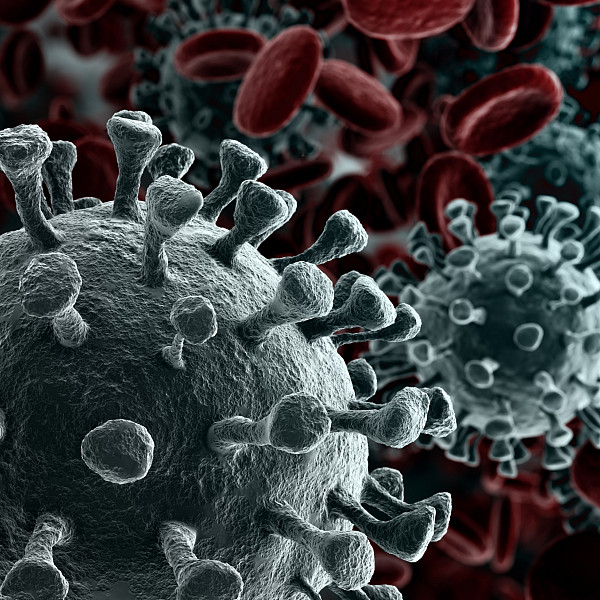News
Scholarly Perspectives on COVID-19, Part 5: The Politics of a Pandemic
September 29, 2020
September 29, 2020
Open gallery

This is the fifth in a series on Southwestern faculty perspectives on severe acute respiratory syndrome coronavirus 2 (SARS-CoV-2) and coronavirus disease 2019 (COVID-19). Part 1 focused on biology, part 2 on mathematics, part 3 on economics, and part 4 on sociology.
During the past 90 years—sorry, I mean nine months—of the ongoing pandemic, we’ve seen politicians clashing with public-health experts and epidemiologists, federal officials trading insults with state and city government leaders, and cable-news pundits shouting down their guests over almost every aspect of COVID-19. FaceTubeTok videos have captured apoplectic customers screaming obscenities at retail and food-service employees for being asked to wear a mask. Asian Americans have been verbally and physically threatened while being erroneously blamed for transmitting the disease. Frontline healthcare workers have had their tires slashed, been evicted from their homes, and been attacked by their own patients because these doctors and nurses are mistakenly believed to be infecting others with the virus.
Granted, earlier in the pandemic, our feeds were also awash with endearing displays of empathy and caregiving, with musicians performing impromptu concerts on their apartment balconies and teenagers delivering groceries to their elderly neighbors. But the pandemic-related vitriol we have seen on social media, the news, and late-night talk shows seems only to be worsening as the U.S. federal election looms nearer. As we battle anxiety about COVID-19 and endure long-term changes to how we work and live—or, far worse, cope with unemployment, illness, or the death of loved ones—it’s no wonder that “2020 sucks” memes are everywhere. Add the acrimony of a politicized pandemic, not to mention concurrent partisan conflicts about systemic racism, immigration, the economy, and climate change, and the one thing we can all agree on, regardless of political affiliation, is that we’re all just plain exhausted.
Assistant Professor of Political Science Emily Sydnor is not immune to this fatigue. But as a scholar specializing in political communication and political psychology, she’s also been observing and analyzing the events of 2020 with keen interest. Her research focuses on incivility in the media, its interaction with individual psychological traits (e.g., whether people like or avoid conflict), and its influence on political behavior. In her recent book, Disrespectful Democracy: The Psychology of Political Incivility (Columbia University Press, 2019), Sydnor argues that the rise of partisan rancor in media has changed our behavior and involvement in the political process. For example, those who shy away from confrontation might participate less in democracy, whereas those who enjoy conflict more often vote, protest, contact their government representatives, and engage friends and family in political discussion. In the following interview, Sydnor shares her insights on the political discourse about COVID-19 and how it, too, has influenced people’s behavior, including their reactions to the ongoing pandemic. She also reflects on what the COVID-19 response in the U.S. reveals about American politics and how the pandemic might affect the 2020 election.
Sydnor argues that the rise of partisan rancor in media has changed our behavior and involvement in the political process.
Given your research and teaching about political rhetoric, the media, and incivility, what’s your perspective on the COVID-19 outbreak?
It’s funny: I think this question was the hardest to answer! One of the things that has stood out to me as a political communication and political psychology scholar is the partisan divergence in assessments of the seriousness of the virus. Almost all the states that took early action were run by Democratic governors that were adamant this was a serious threat, while the president and conservative media maintained a stance that COVID-19 posed little risk and was similar to the flu until mid-March. A difference of opinion like this at the elite level trickles down to citizens, so if you look at polling data, you see gaps in how seriously Democrats and Republicans are taking the virus and, unsurprisingly, in their assessments of how well the president has responded. If we’re viewing this disease through partisan lenses, we’re more likely to selectively learn about the disease in ways that reinforce our existing beliefs and that can ultimately affect the approach we take to our own and our family’s health.
What has the U.S. response to the pandemic revealed about American government and politics?
It’s a really interesting lens through which to evaluate the successes and failures of federalism. Power in American politics has increasingly nationalized: we spend a lot more time paying attention to national politics, mobilizing around national issues, and caring about candidates for national office now than we did years ago, and we spend much less time on state and local politics. But the response to this pandemic in the U.S. has been driven by governors and localities much more than the federal government. On one hand, that presents some challenges: we have a patchwork of stay-at-home orders, for example, and states are trying to outbid each other for PPE [personal protective equipment] shipments that could be coordinated more effectively by a national agency like FEMA [the Federal Emergency Management Agency]. On the other hand, it allows for more tailored responses based on population density, the number of cases, etc., and it mitigates some of the failures and mishandled communication at the national level. This second piece was part of why the Founders wanted to have a federal system: the Anti-Federalists, represented in writing under the pseudonym Brutus, argued that because a national government was less responsible to the people and more likely to overstep its boundaries, we needed to maintain a system that invested substantial power in states and localities.
We’ve been hearing and reading a lot in the media about the importance of leadership in a time of crisis. How might voters’ opinions about the government’s response to COVID-19 affect how they perceive their representatives and their ability to lead?
In my Candidates, Campaigns, & Citizens class, we read a book called Democracy for Realists that makes the argument that people aren’t as good at the rational evaluation of political candidates as we might hope. They’re not selecting the candidate who is ideologically closest to them on policy issues, and they’re not doing a great job of reflecting back on the incumbent official or party, assessing that individual’s success or failure, and then making a decision to vote for them (or not)—a concept called retrospective voting. In the book, part of the way the authors show the failure of retrospective voting is to look at natural disasters. If we were good at retrospective voting, we’d recognize that incumbents have no ability to control something like shark attacks, flooding, or droughts. And yet when we look at the data, there is some evidence that voters penalize incumbents for these very events. Interestingly, so far, voters don’t appear to be blaming Trump for the economic consequences of the virus, although it remains to be seen if that changes the longer the economy struggles under the weight of coronavirus closures and safety precautions.
What do you see as the most significant political issues arising from the COVID-19 outbreak?
In the U.S., what I’m most concerned about is how we will ensure voter accessibility in November. There have been widespread discussions of vote-by-mail in the media, but most states and localities are not equipped to make that happen easily. And before that, you have challenges of registration—in places like Texas, there’s no online registration, so lots of voter registration happens through face-to-face registration drives run by volunteer deputy registrars. You likely saw the photos out of the Wisconsin primary back in April, but the “your vote or your health” calculus could dramatically affect turnout. Imagine that days before the election, the CDC announces that it’s monitoring potential outbreaks in major cities in swing states. Polling places wouldn’t close, it wouldn’t be declared illegal by the Supreme Court, and no one’s vote would be outright denied, but it certainly has the potential to change the outcome of the election.
We already see these sorts of manipulations and power grabs on the international stage, which I think is the other significant issue that will arise from the COVID-19 outbreak. Using coronavirus as his justification, Hungarian Prime Minister Viktor Orban asked for and was granted sweeping emergency powers: anyone identified by the government as spreading “distorted truths” can be jailed, and Orban can suspend existing laws and rule by decree. Most political scientists had already labeled Hungary as an “electoral autocracy” rather than a democracy, but these emergency powers demonstrate how a crisis can be used to tilt a country further toward dictatorship and oppressive regimes. The presence of a regime like this within the European Union (E.U.), coupled with the unequal effects of the disease in Southern and Northern Europe, will pose some serious challenges for supranational organizations like the E.U. as we move forward.
Are there specific articles or books you would recommend to readers who want to learn more about how political scientists approach pandemics or government responses to them?
My favorite—and one I assign all my students who take political psychology—is called Anxious Politics, by Bethany Albertson and Shana Kushner Gadarian. It’s not about pandemics necessarily but how anxiety shapes our political behavior. They spend some time exploring reactions to the threat of disease relative to [reactions] to the threat of something that has been politicized, like immigration or climate change, and they’ve actually written a follow-up article for the Washington Post about how their findings play out in the context of COVID-19. Beyond their book, the Washington Post frequently publishes articles (like the Albertson and Gadarian one I just mentioned) summarizing research that can help us understand the political effects of COVID-19.


















